- Clone
- 9D3.1C8 (See other available formats)
- Regulatory Status
- RUO
- Other Names
- Interleukin-17F, ML-1,
- Isotype
- Mouse IgG1, κ
- Ave. Rating
- Submit a Review
- Product Citations
- publications

-

Th17-polarized CD4+ T cells from C57BL/6 mouse lymph node surface stained with CD4 (GK1.5) APC, then intracellularly stained with anti-mouse IL-17F (clone 9D3.1C8) PE -

Th17-polarized CD4+ T cells from C57BL/6 mouse lymph node intracellularly stained with anti-mouse IL-17F (clone 9D3.1C8) PE and anti-mouse IL-17A (clone TC11-18H10.1) APC
| Cat # | Size | Price | Save |
|---|---|---|---|
| 517007 | 25 µg | ¥23,860 | |
| 517008 | 100 µg | ¥64,970 |
Interleukin 17F (IL-17F) is a 37 kD IL-17 family member. The IL-17 family consists of six members including IL-17 (also called IL-17A), IL-17B, IL-17C, IL-17D, IL-17E (also called IL-25), and IL-17F. IL-17F shares the strongest similarity to IL-17A and forms a homodimer or heterodimer with IL-17A. It is produced by Th17 cells, mast cells, basophils, and epithelial cells. IL-17F is an important regulator of inflammatory responses. It is involved in host defense against mucoepithelial infection by Staphylococcus aureus and Citrobacter rodentium. Over expression of IL-17F gene in the airway of mice is associated with airway neutrophilia, the induction of many cytokines, an increase in airway hyperreactivity, and mucus hyper-secretion. IL-17F is also involved in cancer immunity and autoimmune responses. IL-17F, like IL-17A, depends on IL-17R for its signaling in vitro and in vivo. P38 MAPK, ERK1/2, Act1 (NF-KB activator protein 1), and TRAF6 are involved in IL-17F signaling.
Product DetailsProduct Details
- Verified Reactivity
- Mouse
- Antibody Type
- Monoclonal
- Host Species
- Mouse
- Immunogen
- Mouse IL-17F-OVA
- Formulation
- Phosphate-buffered solution, pH 7.2, containing 0.09% sodium azide.
- Preparation
- The antibody was purified by affinity chromatography and conjugated with PE under optimal conditions.
- Concentration
- 0.2 mg/ml
- Storage & Handling
- The antibody solution should be stored undiluted between 2°C and 8°C, and protected from prolonged exposure to light. Do not freeze.
- Application
-
ICFC - Quality tested
- Recommended Usage
-
Each lot of this antibody is quality control tested by intracellular immunofluorescent staining with flow cytometric analysis. For flow cytometric staining, the suggested use of this reagent is ≤0.25 µg per million cells in 100 µl volume. It is recommended that the reagent be titrated for optimal performance for each application.
- Excitation Laser
-
Blue Laser (488 nm)
Green Laser (532 nm)/Yellow-Green Laser (561 nm)
- Product Citations
-
- RRID
-
AB_10661730 (BioLegend Cat. No. 517007)
AB_10690818 (BioLegend Cat. No. 517008)
Antigen Details
- Structure
- Forms a 37 kD homodimer or heterodimer with IL-17A of the IL-17 family member.
- Distribution
- Th17 cells, mast cells, basophils, and epithelial cells.
- Function
- An important regulator of inflammatory responses, involved in cancer immunity and autoimmune responses as well.
- Ligand/Receptor
- IL-17R (CD217)
- Cell Type
- Th17, Mast cells, Basophils, Epithelial cells
- Biology Area
- Immunology, Innate Immunity
- Molecular Family
- Cytokines/Chemokines
- Antigen References
-
1. Dong C. 2008. Immunol. Rev. 226:80.
2. Kolls JK, et al. 2004. Immunity 21:467.
3. Aggarwal S, et al. 2002. J. Leukoc. Biol. 71:1.
4. Yang XO, et al. 2008. J. Exp. Med. 205:1063.
5. Ishigame H, et al. 2009. Immunity 30:108.
6. Hu Y, et al. 2010. J. Immunol. 184:4307. - Gene ID
- 257630 View all products for this Gene ID
- UniProt
- View information about IL-17F on UniProt.org
Related FAQs
- What type of PE do you use in your conjugates?
- We use R-PE in our conjugates.
Other Formats
View All IL-17F Reagents Request Custom Conjugation| Description | Clone | Applications |
|---|---|---|
| Alexa Fluor® 488 anti-mouse IL-17F | 9D3.1C8 | ICFC |
| PE anti-mouse IL-17F | 9D3.1C8 | ICFC |
| Alexa Fluor® 647 anti-mouse IL-17F | 9D3.1C8 | ICFC |
Customers Also Purchased
Compare Data Across All Formats
This data display is provided for general comparisons between formats.
Your actual data may vary due to variations in samples, target cells, instruments and their settings, staining conditions, and other factors.
If you need assistance with selecting the best format contact our expert technical support team.
-
Alexa Fluor® 488 anti-mouse IL-17F
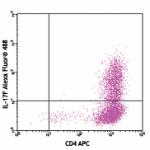
Th17-polarized CD4+ T cells from C57BL/6 mouse lymph node in... 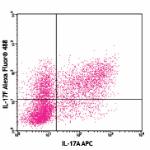
Th17-polarized CD4+ T cells from C57BL/6 mouse lymph node in... -
PE anti-mouse IL-17F
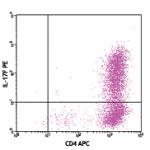
Th17-polarized CD4+ T cells from C57BL/6 mouse lymph node su... 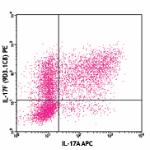
Th17-polarized CD4+ T cells from C57BL/6 mouse lymph node in... -
Alexa Fluor® 647 anti-mouse IL-17F
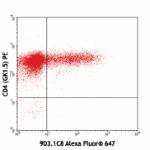
PdBU/ionomycin-stimulated (5 hours) Th17-polarized CD4+... 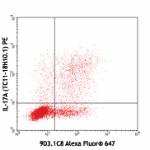
PdBU/ionomycin-stimulated (5 hours) Th17-polarized CD4+...











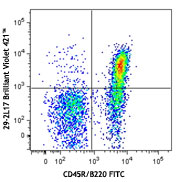
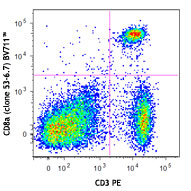
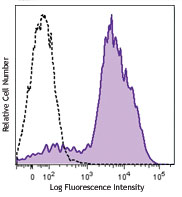




Follow Us